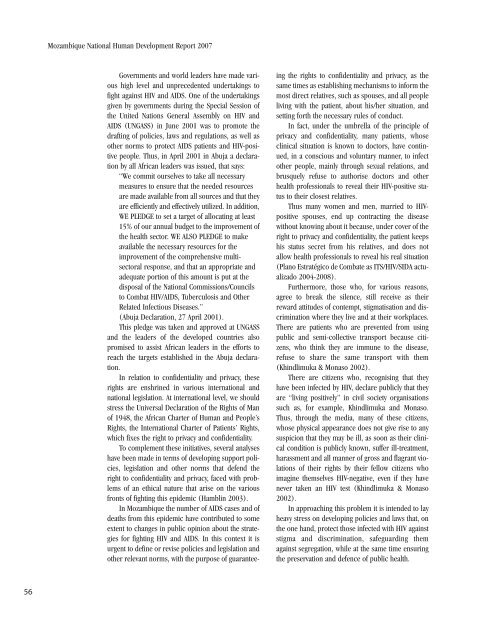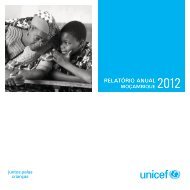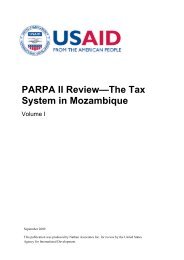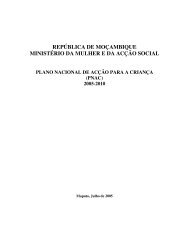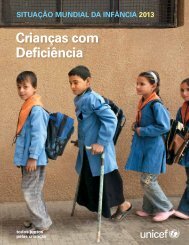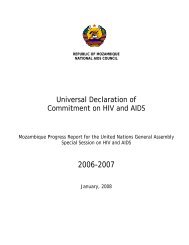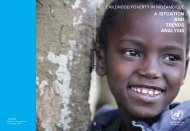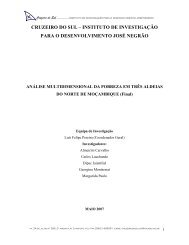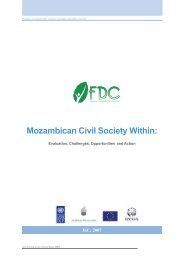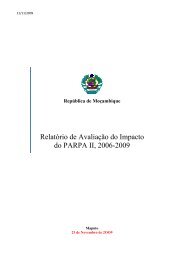English language version - Human Development Reports - United ...
English language version - Human Development Reports - United ...
English language version - Human Development Reports - United ...
- No tags were found...
Create successful ePaper yourself
Turn your PDF publications into a flip-book with our unique Google optimized e-Paper software.
Mozambique National <strong>Human</strong> <strong>Development</strong> Report 2007Governments and world leaders have made varioushigh level and unprecedented undertakings tofight against HIV and AIDS. One of the undertakingsgiven by governments during the Special Session ofthe <strong>United</strong> Nations General Assembly on HIV andAIDS (UNGASS) in June 2001 was to promote thedrafting of policies, laws and regulations, as well asother norms to protect AIDS patients and HIV-positivepeople. Thus, in April 2001 in Abuja a declarationby all African leaders was issued, that says:“We commit ourselves to take all necessarymeasures to ensure that the needed resourcesare made available from all sources and that theyare efficiently and effectively utilized. In addition,WE PLEDGE to set a target of allocating at least15% of our annual budget to the improvement ofthe health sector. WE ALSO PLEDGE to makeavailable the necessary resources for theimprovement of the comprehensive multisectoralresponse, and that an appropriate andadequate portion of this amount is put at thedisposal of the National Commissions/Councilsto Combat HIV/AIDS, Tuberculosis and OtherRelated Infectious Diseases.”(Abuja Declaration, 27 April 2001).This pledge was taken and approved at UNGASSand the leaders of the developed countries alsopromised to assist African leaders in the efforts toreach the targets established in the Abuja declaration.In relation to confidentiality and privacy, theserights are enshrined in various international andnational legislation. At international level, we shouldstress the Universal Declaration of the Rights of Manof 1948, the African Charter of <strong>Human</strong> and People’sRights, the International Charter of Patients’ Rights,which fixes the right to privacy and confidentiality.To complement these initiatives, several analyseshave been made in terms of developing support policies,legislation and other norms that defend theright to confidentiality and privacy, faced with problemsof an ethical nature that arise on the variousfronts of fighting this epidemic (Hamblin 2003).In Mozambique the number of AIDS cases and ofdeaths from this epidemic have contributed to someextent to changes in public opinion about the strategiesfor fighting HIV and AIDS. In this context it isurgent to define or revise policies and legislation andother relevant norms, with the purpose of guaranteeingthe rights to confidentiality and privacy, as thesame times as establishing mechanisms to inform themost direct relatives, such as spouses, and all peopleliving with the patient, about his/her situation, andsetting forth the necessary rules of conduct.In fact, under the umbrella of the principle ofprivacy and confidentiality, many patients, whoseclinical situation is known to doctors, have continued,in a conscious and voluntary manner, to infectother people, mainly through sexual relations, andbrusquely refuse to authorise doctors and otherhealth professionals to reveal their HIV-positive statusto their closest relatives.Thus many women and men, married to HIVpositivespouses, end up contracting the diseasewithout knowing about it because, under cover of theright to privacy and confidentiality, the patient keepshis status secret from his relatives, and does notallow health professionals to reveal his real situation(Plano Estratégico de Combate as ITS/HIV/SIDA actualizado2004-2008).Furthermore, those who, for various reasons,agree to break the silence, still receive as theirreward attitudes of contempt, stigmatisation and discriminationwhere they live and at their workplaces.There are patients who are prevented from usingpublic and semi-collective transport because citizens,who think they are immune to the disease,refuse to share the same transport with them(Khindlimuka & Monaso 2002).There are citizens who, recognising that theyhave been infected by HIV, declare publicly that theyare “living positively” in civil society organisationssuch as, for example, Khindlimuka and Monaso.Thus, through the media, many of these citizens,whose physical appearance does not give rise to anysuspicion that they may be ill, as soon as their clinicalcondition is publicly known, suffer ill-treatment,harassment and all manner of gross and flagrant violationsof their rights by their fellow citizens whoimagine themselves HIV-negative, even if they havenever taken an HIV test (Khindlimuka & Monaso2002).In approaching this problem it is intended to layheavy stress on developing policies and laws that, onthe one hand, protect those infected with HIV againststigma and discrimination, safeguarding themagainst segregation, while at the same time ensuringthe preservation and defence of public health.56


